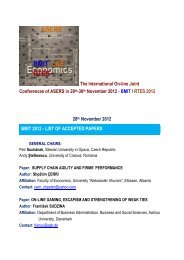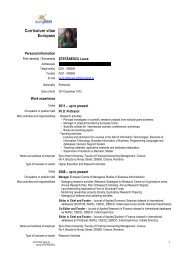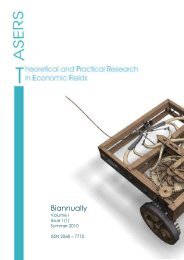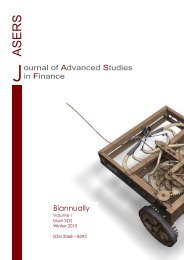eBook of Abstracts - ASERS
eBook of Abstracts - ASERS
eBook of Abstracts - ASERS
Create successful ePaper yourself
Turn your PDF publications into a flip-book with our unique Google optimized e-Paper software.
The First Online International Conference<br />
29 May, 2010<br />
The Crises <strong>of</strong> the Credits and its Implications in Romania<br />
Laura Ungureanu<br />
Spiru Haret University, Romania<br />
ungureanu@lycos.com<br />
Abstract:<br />
Countries <strong>of</strong> Central and Eastern Europe have been extremely affected by the crisis, not<br />
only because they have suffered a decline in domestic demand and exports, but many <strong>of</strong> them<br />
suffering from the effects <strong>of</strong> depreciation relative to their foreign currency loans. In addition, access<br />
to external credit has been restricted and the costs rose. Finally, capacitive their exit from the crisis<br />
on account <strong>of</strong> public expenditures is extremely limited.<br />
Unfortunately, as seen fairly quickly in early 2009, Romania is not so simple as Western.<br />
Public investment looks good on paper, but their practical implementation requires administrative<br />
capacity, project managers and consistency in action. Romania faces its first economic crisis since<br />
the fall <strong>of</strong> communism, as its 2008 performance, with a record economic growth <strong>of</strong> about 9% in the<br />
first nine months <strong>of</strong> 2008, was significantly slowed down by the global financial crisis. European<br />
Bank for Reconstruction and Development (EBRD) has reduced its growth forecast for Romania this<br />
year from 1.3% to zero, considering that new measures to reduce the budget deficit will limit<br />
domestic demand.<br />
Under existing circumstances, in this paper we want to make an analysis <strong>of</strong> the current<br />
economy in Romania and debate the possible settlement to solve this.<br />
Keywords: crises, economic growth, credits.<br />
JEL Classification: E51, N1, R11.<br />
Support <strong>of</strong> Small - Medium Size Enterprises (SME) - Opportunity for<br />
Kosovo to Overcome Economic Crisis<br />
Fatos, Ukaj<br />
Faculty <strong>of</strong> Applied Science in Business, Pejë, Kosovo<br />
fatos_ukaj@yahoo.com<br />
Abstract:<br />
It is already common that economists accept that SME are engine <strong>of</strong> the economic<br />
development, and that this Part <strong>of</strong> national industry in most <strong>of</strong> the so called „East Europe “and<br />
developing countries, that is promoter <strong>of</strong> the private initiative and entrepreneur skills. SME have an<br />
advantage in it that are so flexible, they react quickly on market demand and they are adaptable on<br />
changes.<br />
Kosovo as country with an emerging economy, which came out <strong>of</strong> the 20 year conflict<br />
period, is in a turning point that will determine the future <strong>of</strong> a national economy, which is so depend<br />
and oriented in import <strong>of</strong> the goods. SME are facing difficulties in their attempt to stabilize their<br />
business and compete with foreign products present on the domestic market. In Europe union<br />
countries, governments make regulations with the aim to support SME on their strength and<br />
competitiveness. Same methodology has to be adopted in Kosovo case, insisting on support <strong>of</strong><br />
SME, and application <strong>of</strong> best practices from EU countries, developing economies and other success<br />
cases.<br />
Keywords: small-medium enterprise, economic development, support, competitiveness.<br />
JEL Classification: F01, L25, O11.<br />
11











